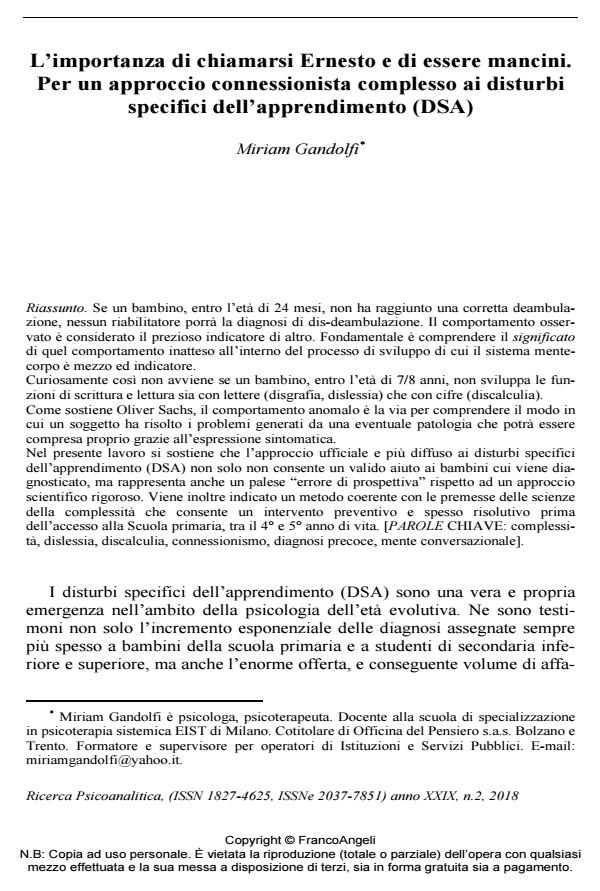The importance of being Earnest and of being left-handed. For a complex connectionist approach to specific learning disabilities (SLD)
Journal title RICERCA PSICOANALITICA
Author/s Miriam Gandolfi
Publishing Year 2018 Issue 2018/2
Language Italian Pages 21 P. 53-73 File size 778 KB
DOI 10.3280/RPR2018-002004
DOI is like a bar code for intellectual property: to have more infomation
click here
Below, you can see the article first page
If you want to buy this article in PDF format, you can do it, following the instructions to buy download credits

FrancoAngeli is member of Publishers International Linking Association, Inc (PILA), a not-for-profit association which run the CrossRef service enabling links to and from online scholarly content.
If a 2 year old child has not achieved a proper level of ambulation, no rehabilitator would diagnose dys-ambulation. The observed behaviour is considered a precious indicator of something more. The essential aspect is to understand the meaning of that unexpected behaviour within the process of childhood development whose one indicator is the body-mind system. Oddly enough this doesn’t happen if a child, by the age of 7/8 years has not developed writing and reading skills both with characters (dysgraphia, dyslexia) and numbers (dyscalculia). As argued by Oliver Sacks, an anomalous behaviour is the path to under-standing how a subject has solved the problems generated by a possible pathology that may be understood exactly by means of this symptomatic expression. In this article we discuss how the official and most widespread approach regarding specific learning disabilities (SLD), not only does not provide efficient help for children with an SLD diagnosis, but represents also a clear "perspective mistake" in regard to a rigorous scientific approach. Furthermore we indicate a method that is consistent with the premises of the sciences of complexity and allows a preventive, and often resolutive, intervention before entering primary school, between the fourth and fifth year of life
Keywords: Complexity, dyslexia, dyscalculia, connectionism, early diagnosis, conversational mind
- Rappresentazioni e atteggiamenti degli insegnanti verso le diagnosi di DSA: costruzione e validazione preliminare di un questionario Eleonora Florio, Letizia Caso, Ilaria Castelli, in RICERCHE DI PSICOLOGIA 1/2022 pp.1
DOI: 10.3280/rip2022oa13224 - Hanno ucciso l’Uomo Ragno. Nascita, splendore, declino di una fase mitica della psicopatologia clinica e della psicoterapia. C’è ancora margine per una loro dignità scientifica? Una proposta connessionista complessa Miriam Gandolfi, in Ricerca Psicoanalitica /2022
DOI: 10.4081/rp.2022.608
Miriam Gandolfi, L’importanza di chiamarsi Ernesto e di essere mancini. Per un approccio connessionista complesso ai disturbi specifici dell’apprendimento (DSA) in "RICERCA PSICOANALITICA" 2/2018, pp 53-73, DOI: 10.3280/RPR2018-002004